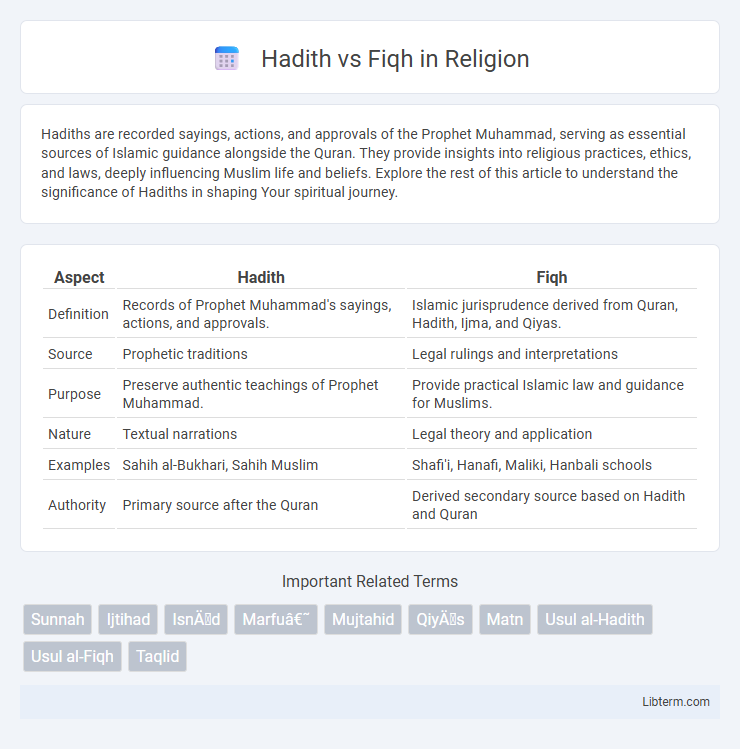Hadiths are recorded sayings, actions, and approvals of the Prophet Muhammad, serving as essential sources of Islamic guidance alongside the Quran. They provide insights into religious practices, ethics, and laws, deeply influencing Muslim life and beliefs. Explore the rest of this article to understand the significance of Hadiths in shaping Your spiritual journey.
Table of Comparison
| Aspect | Hadith | Fiqh |
|---|---|---|
| Definition | Records of Prophet Muhammad's sayings, actions, and approvals. | Islamic jurisprudence derived from Quran, Hadith, Ijma, and Qiyas. |
| Source | Prophetic traditions | Legal rulings and interpretations |
| Purpose | Preserve authentic teachings of Prophet Muhammad. | Provide practical Islamic law and guidance for Muslims. |
| Nature | Textual narrations | Legal theory and application |
| Examples | Sahih al-Bukhari, Sahih Muslim | Shafi'i, Hanafi, Maliki, Hanbali schools |
| Authority | Primary source after the Quran | Derived secondary source based on Hadith and Quran |
Understanding Hadith: Definition and Importance
Hadith refers to the recorded sayings, actions, and approvals of the Prophet Muhammad, serving as a primary source of Islamic guidance alongside the Quran. Understanding Hadith is crucial for interpreting religious practices and laws, as it provides context and elaboration on Quranic injunctions. The authenticity and application of Hadith directly impact the development of Fiqh, or Islamic jurisprudence, shaping legal rulings and ethical norms within Muslim communities.
Defining Fiqh: The Science of Islamic Jurisprudence
Fiqh, the science of Islamic jurisprudence, systematically interprets and applies the divine guidance found in the Quran and Hadith to practical legal rulings and ethical norms. It involves deriving detailed laws and principles governing worship, transactions, and social conduct through methodologies like Ijma (consensus), Qiyas (analogical reasoning), and Ijtihad (independent reasoning). Unlike Hadith, which are the recorded sayings and actions of the Prophet Muhammad, Fiqh organizes these texts into coherent legal frameworks enabling Muslims to fulfill religious obligations in varying contexts.
Sources of Hadith and Their Classification
Hadith sources primarily include the sayings, actions, and approvals of Prophet Muhammad, transmitted through rigorous chains of narrators called Isnad. These narrations are classified into categories such as Sahih (authentic), Hasan (good), and Da'if (weak) based on the reliability and continuity of the chain, as well as the content's consistency with established principles. Understanding the classification of Hadith is essential for deriving Fiqh, the Islamic jurisprudence, which relies on authentic Hadith to formulate legal rulings and ethical guidelines.
Foundations and Methodologies of Fiqh
The foundations of Fiqh are primarily derived from the Quran, Hadith, Ijma (consensus), and Qiyas (analogical reasoning), forming a structured methodology for Islamic jurisprudence. Hadith provide essential prophetic traditions that serve as a critical source of law alongside the Quran, but Fiqh employs systematic principles to interpret and apply these texts within diverse contexts. Methodologies of Fiqh include usul al-fiqh (principles of jurisprudence), enabling jurists to accommodate new issues by deriving rulings through consensus, analogy, and ijtihad (independent reasoning).
Key Differences Between Hadith and Fiqh
Hadith refers to the recorded sayings, actions, and approvals of Prophet Muhammad, serving as a primary source of Islamic guidance, while Fiqh is the Islamic jurisprudence derived from interpreting the Quran, Hadith, Ijma (consensus), and Qiyas (analogical reasoning) to formulate legal rulings. Hadith provides the foundational texts necessary for understanding Sharia, whereas Fiqh represents the scholarly effort to apply these texts to practical legal and ethical matters. The distinction lies in Hadith being the raw textual evidence and Fiqh being the systematic discipline that interprets and implements these texts in varied contexts.
The Role of Hadith in Shaping Fiqh
Hadith plays a critical role in shaping Fiqh by providing the Prophet Muhammad's sayings, actions, and approvals that serve as primary sources for Islamic jurisprudence alongside the Quran. Scholars analyze Hadith to derive legal rulings, distinguishing authentic narrations to ensure accurate interpretation within Fiqh. The integration of Hadith into Fiqh enables the development of detailed laws governing worship, transactions, and personal conduct in Islamic law.
Interaction Between Hadith Scholars and Jurists
Hadith scholars and jurists engage in a dynamic interaction where authentic Prophetic traditions serve as crucial evidence in shaping Islamic law, or fiqh. Hadith verification techniques, including isnad (chain of transmission) analysis, directly influence jurists' interpretations and legal rulings. This collaboration ensures that fiqh remains anchored in the Sunnah while adapting to evolving societal contexts.
Examples: When Hadith and Fiqh Diverge
Hadith represents the recorded sayings and actions of Prophet Muhammad, serving as primary sources for Islamic teachings, while Fiqh is the human interpretation and jurisprudence derived from the Quran and Hadith to guide practical legal rulings. Examples of divergence occur when a Hadith indicates a specific practice, such as the Prophet's method of prayer, but Fiqh scholars interpret it differently due to varying contexts or evolving societal needs, like differences in the number of prayer units or timing. Another case is inheritance laws, where Hadith provide foundational rules, yet Fiqh schools offer distinct rulings based on juristic methodologies and principles of equity.
The Impact on Islamic Law and Daily Practice
Hadith serves as the foundational source for Fiqh, providing the Prophet Muhammad's sayings and actions that guide legal interpretations in Islamic law. Fiqh translates these hadiths into comprehensive legal rulings, directly influencing daily practices such as prayer, fasting, and commercial transactions. The interaction between Hadith and Fiqh ensures that Islamic law remains dynamic and applicable to contemporary Muslim life.
Contemporary Debates on Hadith and Fiqh Authority
Contemporary debates on Hadith and Fiqh authority revolve around the authenticity and application of Prophetic traditions in modern legal contexts. Scholars challenge traditional Hadith classifications, emphasizing critical methodologies to reconcile classical jurisprudence with current societal needs. The tension between maintaining orthodox Fiqh principles and adapting to contemporary ethical issues underscores ongoing discourse in Islamic legal theory.
Hadith Infographic

 libterm.com
libterm.com